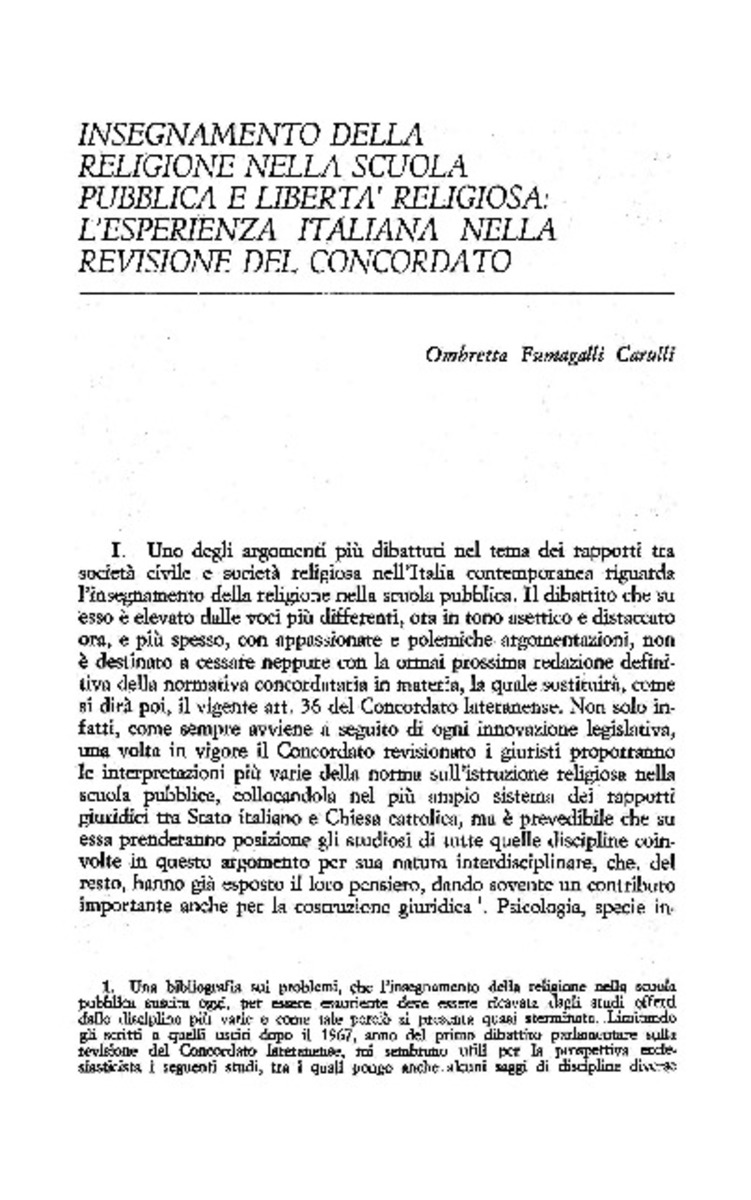Full metadata record
| DC Field | Value | Language |
|---|---|---|
| dc.creator | Fumagalli-Carulli, O. (Ombretta) | |
| dc.date.accessioned | 2010-09-07T11:10:18Z | - |
| dc.date.available | 2010-09-07T11:10:18Z | - |
| dc.date.issued | 1979 | - |
| dc.identifier.citation | Fumagalli Carulli, Ombretta. ""Insegnamento della religione nella scuola pubblica e liberta´ religiosa: lésperienza italiana nella revisione del concordato"". Persona y Derecho, 6 (1979) : 313-349. | es_ES |
| dc.identifier.issn | 0211-4526 | - |
| dc.identifier.uri | https://hdl.handle.net/10171/11923 | - |
| dc.description.abstract | The probIem of religious instruction in public schooIs is one of the central themes of the cultural and judicial controversyconcerning relations between the civil and religious realms in modern·day Italy. This controversy is pIaced within the generalframework of poIemics which have arisen as a consequence of the revision of the Concordat of Latran and, more precisely, concerning Article 36 o~ the Concordat. From a judicial point of view the author points out the difference that exists between Article 36 which presendy regulates the teaching of religion in State schools, and Article 9 of the «ProposaIs prior to Agreement on the Revision of the Concordab -the so-called«Casaroli·Gonella Joint Projecb. After explaining the different historica1 and cultural backgrounds that have given rise to the two articles, the author interprets Article 9 of the «Joint Project» on the basis of religious freedom, which is a basic principIe of the democratic ltalian State and which can be manifested by the possibility of asking to be exempted from having to attend religion class. Theauthor also analyzes possibIe declarations of principIes which may justify the presence of religious instruction in public schools, and then proceeds to consider the fact that these declarations of principIes are useful in orienting course content and programS. He also examines the norms proposed in 1977 in a preliminary paper drawn up after the «Joint Project»; this «Draft», as it is called, has as its main aim the improvement of the «Joint Jroject» and merits, in the author's view, a positive appraisal, as does the mention made to «religious culture» in Article 9, insofar as we are to understand that culture is a factor that constitutes part of the individual's formation of personality. Finally, the author foresees that the final draft of the new Concordat will consider that religious instruction in public schooIs has to be based upon the fundaments of religious liberty understood in its most ampIe sense. This includes, at the same time, the freedom of remaining indifferent: the author reminds us of the different technica1 ruses that can be depIoyed to this effect. On the other hand, everything is in harmony regarding both the dec1srations of Vatiean Council II and the constitutional framework of the ltalian State. Therefore, the situation adapts itself to the view that the Concordat is an instrument of freedom for individuaIs as well as for groups, and can not be interpreted as an exchange of privileges. | es_ES |
| dc.language.iso | ita | es_ES |
| dc.publisher | Servicio de Publicaciones de la Universidad de Navarra | es_ES |
| dc.rights | info:eu-repo/semantics/openAccess | es_ES |
| dc.subject | Materias Investigacion::Derecho | es_ES |
| dc.title | Insegnamento della religione nella scuola pubblica e liberta´ religiosa: lésperienza italiana nella revisione del concordato | es_ES |
| dc.type | info:eu-repo/semantics/article | es_ES |
| dc.identifier.doi | 10.15581/011.32734 | es_ES |
Files in This Item:
Statistics and impact
Items in Dadun are protected by copyright, with all rights reserved, unless otherwise indicated.






